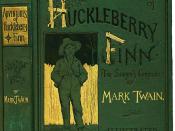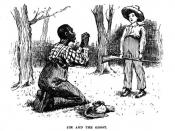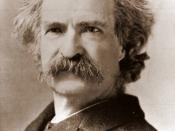In Huckleberry Finn, Mark Twain simply wrote about a boy and the river. In doings so Twain presents the reader with his personal view of mankind, whether he wants to or not:
Persons attempting to find a motive in this narrative will be prosecuted; persons attempting to find a moral in it will be banished; persons attempting to find a plot will be shot. (2)
Possibly by giving us this warning Twain admits to the existence of a clear motive, morality, and a strong plot in his masterpiece. Nonetheless, Huckleberry Finn, through examples of hypocrisy, greed, violence, and racism, shows Twain's pessimistic view of society and corruption of the human race as a whole.
To understand the pessimism of the book, we must first understand Huck. Huck is a character though whose eyes we see the ugly truth about mankind. Huck is always on the run from people. In the beginning we see him living a prim and proper life with the widow.
He is then abducted by his father, and for a time is relieved to get out of the moral trappings of the town, and live sloppily, doing whatever he wanted to do. 'It was kind of lazy and jolly, laying off comfortable all day.' (24) After some time, and being unable to endure the abuse of his father, he runs away. Huck is as dissatisfied by one extreme as he is by the next. Huck chooses not to take sides on any matter, but instead be indifferent towards it. Huck avoids moral decision making throughout the book as much as possible. In the end of the book Twain saves Huck's indifferent persona by bringing in Tom to make the decisions for him.
Some may argue that in saving Jim , Huck saves face for the human...


